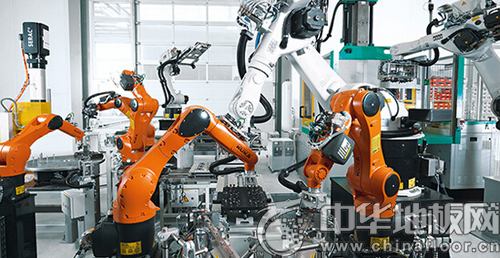Robots and people grab the rice bowl? Home business intelligence upgrade is only Shantou?
At a time when labor costs are still high, recently, Foxconn has attracted widespread attention in reducing the number of employees employed by the company and installing 40,000 robots at production sites across China. Today, "Made in China" has been criticized, "machine substitution" and "Industry 4.0" seem to be popular overnight, and the home industry naturally can not escape the baptism of this concept. However, is this "robot" project really a smart upgrade or just a gimmick? Will the robot grab a job with people?

Robots and people grab the rice bowl? Home business intelligence upgrade is only Shantou? (Photo source network)
"Machine substitution" is limited to companies with certain strength
After Industry 4.0 was introduced in Germany, many Guangdong enterprises are actively responding. There are also some examples in the furniture industry, but these models are still relatively few and may be limited to certain types of products. However, for most of the current enterprises, is there enough economic strength and ability to take up this reform? So, is “smart creation†in the home industry just a gimmick?
A home furnishing company set up a team last year to buy robots from outside to develop their own small production lines, and the parts were machined by the machine itself. The person in charge of the company introduced, “Add a part, the robot will say, please take two boards out, telling you whether it is placed horizontally or vertically. After entering, it will automatically cut, flow out from the order processing supply chain and pass to the machine. Efficiency It is 6-8 times that of a general company."
We don't know if it is as efficient as the above-mentioned companies, and the efficiency can reach 6-8 times that of the average company. But there are not many companies that can do this. Most companies face many difficulties. The "machine substitution" is a good thing to say, but it is not easy to implement. Behind it is often a huge amount of equipment investment, and problems such as machine damage and lack of maintenance will surface. In addition, the robot concept has been smashed into pigs in the Chinese capital market, but in fact, most robot companies are still struggling at the low end, lacking core technology.
Although there are still many shortcomings in this new concept, there are still many companies that can't effectively solve these problems. So for most companies, it is actually just a propaganda gimmick, just a mechanized mechanization. “Machine substitution†is limited to those companies that have certain strength and have basic skills.
Will "machine substitution" threaten the jobs of workers in the home industry?
Ma Yun once predicted that "the robot industry will have a leap forward in 30 years, and the future robots will be as popular as cars and airplanes." Similarly, we also saw that Foxconn cut 60,000 people. So, does “machine substitution†threaten the value of workers in the home industry?
In fact, there are two main reasons for the rise of “machine substitution†in the home industry: First, the ever-decreasing profits and rising labor costs are compressing the living space of traditional furniture manufacturing; second, under the leadership of the government, China’s The economy is undergoing structural adjustment in transformation and upgrading. The hardware and software of enterprises must keep pace with the country's progress from “Made in China†to “Created in Chinaâ€.
"Made in China" has always been synonymous with low quality and low price. As the world's largest manufacturing plant, China's manufacturing status has been difficult to improve, because there are still many manufacturing industries that have remained at the level of mass production. As a large part of the traditional manufacturing industry, the household industry is often exposed to excessive chemical content and wood fraud. The imitation, reproduction and plagiarism of product design are also emerging. With the upgrade of "Industry 4.0", I believe that these problems can be improved.
On the other hand, for the home industry, traditional craftsmen are more aware of some of the characteristics of the production process, and it is obviously not practical to completely press the adjustment of the process on a robot. A sophisticated and intelligent robot must accept human instructions and serve people rather than threaten the value of workers. The labor resources liberated by the robot can be deployed to more sophisticated positions.
The advancement of science and technology will inevitably promote the development of productivity, and in turn reduce the labor intensity of people. As automation technology matures, more and more robots replace people's jobs. Those dangerous, heavy, and boring jobs are done by robots. We should not feel frustrated and panic, but should be happy.
"Machine substitution" is a double-edged sword. Well used, the competitiveness of enterprises is rapidly increasing, and they are on the fast track of development; they are not used well, investment fails, benefits are affected, and even enterprises fail. In the labor-intensive home industry, large-scale automation can save costs, improve efficiency, and release labor, so "machine substitution" is definitely the general trend. But how to understand the "machine substitution" and how to effectively implement the targeted "machine substitution" will determine the success or failure of the company in the new round of competition.
item :3-way concealed adjustable hinge
material :zinc
capacity :40kgs/60kgs/80kgs/100kgs/120kgs/200kgs
Door Hinges,Cabinet Hinges,Cabinet Door Hinges,Concealed Door Hinges
Wenzhou Zhaoxia Hardware Co.,Ltd , https://www.zhaoxiahardware.com